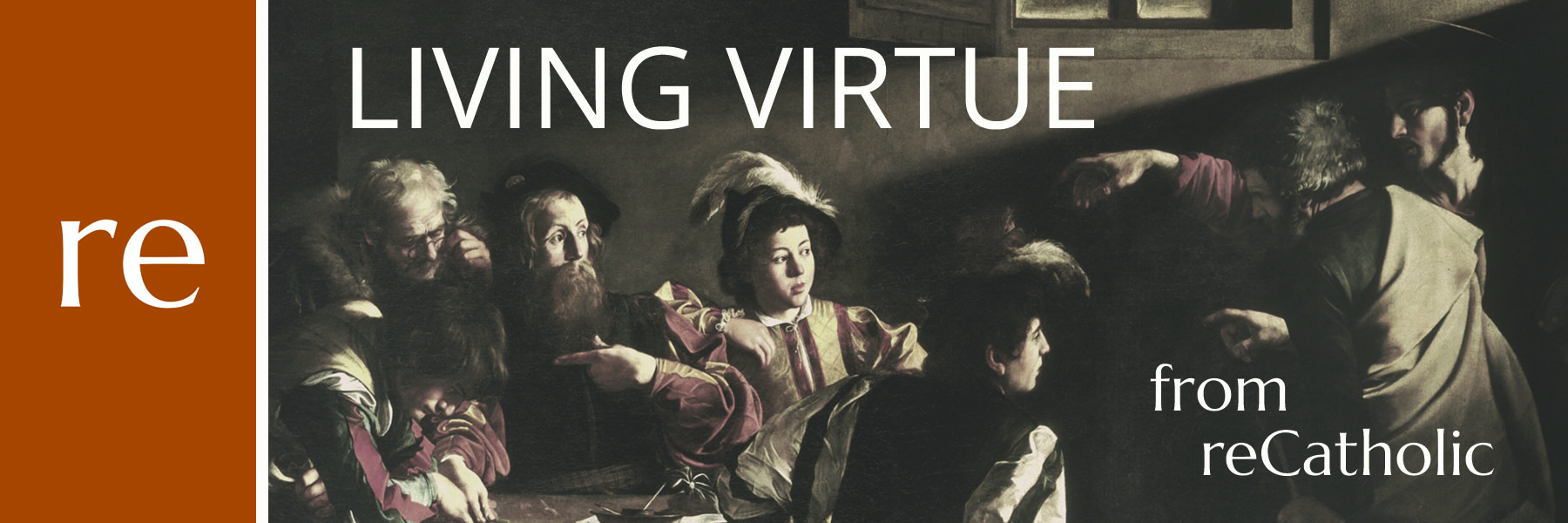
Virtue – Patience
The virtue of Christian patience is more than being able to wait your turn in line, it is the good habit of being able to experience physical and moral hardship with purpose and positivity.
1. Understand Patience
What is Patience?
The life of the person who believes in God is different because everything they do has eternal purpose. Bearing hardships patiently has meaning for Christians, since we accept God’s providence with trust.
People from all walks of life have to suffer; so instead of complaining or trying to run from the difficulties that God permits in our lives, practicing patience helps us to face them with faith, trust and love. Contemplating the sufferings that Jesus endured for us during His life can also help us to imitate His sacrifices with patience.
Acknowledging our sins is also part of patience, because we learn to offer up pain and discomfort in reparation for our faults, with the firm hope of living perfectly happy one day in heaven.
Patience is both a virtue that can be attained with practice and a fruit of living according to the ways of God.
From the Catechism
CCC 1832 The fruits of the Spirit are perfections that the Holy Spirit forms in us as the first fruits of eternal glory. the tradition of the Church lists twelve of them: “charity, joy, peace, patience, kindness, goodness, generosity, gentleness, faithfulness, modesty, self-control, chastity.” (112)
The Virtue Lived – St. Francis de Sales
 Born in 1567 just outside of Switzerland, St. Francis de Sales was known as the Gentleman Doctor. Following in his father’s footsteps, at the age of 24, Francis became a lawyer. But he felt God was calling him, and in 1593 he was ordained to the Priesthood.
Born in 1567 just outside of Switzerland, St. Francis de Sales was known as the Gentleman Doctor. Following in his father’s footsteps, at the age of 24, Francis became a lawyer. But he felt God was calling him, and in 1593 he was ordained to the Priesthood.
After the Protestant Reformation, St. Francis recognized the need to bring souls back to Catholicism. He worked diligently preaching the Gospel, handing out leaflets on Catholic perspectives, and evangelizing those who would listen. His efforts resulted in many returning to the Church, as well as being appointed as Bishop of Geneva.
St. Francis de Sales understood that big changes take time, and that patience is a virtue. Knowing this he took any step he could to deliver the messages of the Catholic Church. He would go door to door, only to have them slammed in his face. But that didn’t stop him. He found a new way of delivering his words. By writing messages on paper and sliding them under doorways as well as showing kindness to children, St. Francis gained trust. It is estimated that throughout his lifetime he brought over 40,000 people back to God.
“Have patience to walk with short steps until you have wings to fly.”
2. Virtue In My Life
Spiritual Questionnaire
Questions geared towards self knowledge and personal growth
Struggles
- What challenges my patience the most? People who upset me? Having to wait? Not being successful? When things don’t go my way? Physical pain?
- When I experience impatience, is it more an emotional, angry frustration, or is it more like an interior feeling of restlessness? Do I tend to lose my temper? Do I treat others without respect?
- What kinds of things help me when I’m impatient? Seeing things from someone else’s perspective? Calming or breathing exercises? Distracting myself with something else?
- When I am impatient, for the most part, am I motivated by selfish desires or am I trying to look out for others’ needs? For example, am I frustrated inside because I don’t want to wait, or rather because I don’t want to see someone else suffer?
Highlights
- Are there people that I am capable of being extremely patient with? What makes it easier for me?
- Can I remember any times when I was willing to put in long hard work to achieve some goal? What kept me going? Do I often reflect on the greater good that I gain by accepting hardships with patience?
- Are there hobbies or pastimes that I enjoy investing a lot of time into? What is it about these activities that keeps me motivated?
Prayer
- Do I ask God to help me see all things from His perspective so that I can patiently bear trials with peace and perseverance?
- Am I in the habit of trying to prayerfully dig deeper into what motivates any of my feelings of impatience, to sift the selfish motives from the good ones?
- Do I meditate on God’s own example of patiently dealing with humanity with his mercy and love? Do I often thank Jesus for the extreme example of patience He showed during his Passion?
- Do I often spontaneously ask God for His assistance when I’m feeling impatient?
3. Growing In Virtue
A Prayer for Virtue
Jesus, give me patience when things don’t go my way. Teach me to offer my sufferings as a sacrifice, united to Yours on the cross. Let me find peace in situations I can’t control or change because I trust in You. Amen.
St. Francis de Sales // Pray for us
Practical Tips for Living This Virtue
- Common tips for patience have to do with controlling outbursts of emotion by counting to 10 or a similar practical distracting routine. Yet real Christian patience doesn’t try to hide from pain, rather the practice of this virtue helps us to find meaning in the things that try us. There’s nothing wrong with curbing our emotions, as long as it gives us the space to ask questions like: “What can I gain from this? What can I learn? How would God view this trial I’m facing?”
- Patience mostly has to do with our interior disposition. When we choose sacrifices for a greater cause, they are much easier to swallow than when they are imposed upon us. For example, choosing exercise for the purpose of staying healthy is certainly easier than bearing illness with the hope of returning to health. With this in mind, when we are faced with trials that we cannot control, it can be very fruitful to choose to accept them, for the purpose of gaining humility, fortitude, patience and love.
- Keep in mind that patience is best made to grow in moments when we are tested. When we see the opportunity in every trial, this will change our perspective and help us to grow little by little.
4. Other Resources
More From The Catechism of the Catholic Church
227 It means trusting God in every circumstance, even in adversity. A prayer of St. Teresa of Jesus wonderfully expresses this trust:
Let nothing trouble you / Let nothing frighten you
Everything passes / God never changes
Patience / Obtains all
Whoever has God / Wants for nothing
God alone is enough.522046 By living with the mind of Christ, Christians hasten the coming of the Reign of God, “a kingdom of justice, love, and peace.”91 They do not, for all that, abandon their earthly tasks; faithful to their master, they fulfill them with uprightness, patience, and love.
2219 Filial respect promotes harmony in all of family life; it also concerns relationships between brothers and sisters. Respect toward parents fills the home with light and warmth. “Grandchildren are the crown of the aged.”26 “With all humility and meekness, with patience, [support] one another in charity.”27
2522 Modesty protects the mystery of persons and their love. It encourages patience and moderation in loving relationships; it requires that the conditions for the definitive giving and commitment of man and woman to one another be fulfilled. Modesty is decency. It inspires one’s choice of clothing. It keeps silence or reserve where there is evident risk of unhealthy curiosity. It is discreet.
2533 Purity of heart requires the modesty which is patience, decency, and discretion. Modesty protects the intimate center of the person.
2668 The invocation of the holy name of Jesus is the simplest way of praying always. When the holy name is repeated often by a humbly attentive heart, the prayer is not lost by heaping up empty phrases,19 but holds fast to the word and “brings forth fruit with patience.”20 This prayer is possible “at all times” because it is not one occupation among others but the only occupation: that of loving God, which animates and transfigures every action in Christ Jesus.
2772 From this unshakeable faith springs forth the hope that sustains each of the seven petitions, which express the groanings of the present age, this time of patience and expectation during which “it does not yet appear what we shall be.”22 The Eucharist and the Lord’s Prayer look eagerly for the Lord’s return, “until he comes.”23
Quotes From Saints
When you encounter difficulties and contradictions, don’t try to break them, but bend them with gentleness and time. – Francis de Sales
God measures out affliction according to our need. – John Chrysostom
He submitted Himself to the elements, to cold and heat, hunger and thirst … concealing His power and giving it up, taking on the likeness of man, so that He might teach us weak and wretched mortals with what patience we ought to bear tribulation. – Angela of Foligno
We can never know how patient or humble someone is when everything is going well with him. But when those who should cooperate with him do exactly the opposite, then we can know. A man has as much patience and humility as he has then, and no more. – Francis of Assisi
Patience is the root and guardian of all the virtues. – Pope Gregory the Great
Let your understanding strengthen your patience. In serenity look forward to the joy that follows sadness. – Peter Damian
Suffering out of love for God is better than working miracles. – John of the Cross
Books
Searching for and Maintaining Peace – Jacques Philippe
Videos
Suffering in Patience – Fr. Keith O’Hare
Patience and the Spiritual Life – Matt Fradd
Videos en Español
Paciencia – P. Gustavo Lombardo
Footnotes
19 Cf. Mt 6:7.
20 Cf. Lk 8:15.22 1 Jn 3:2; Cf. Col 3:4.
22 1 Jn 3:2; Cf. Col 3:4.
23 1 Cor 11:26.
26 Prov 17:6.
27 Eph 4:2.
52 St. Teresa of Jesus, Poesias 30 in the Collected Works of St. Teresa of Avila, vol. III, tr. K. Kavanaugh OCD and O. Rodriguez OCD (Washington DC Institute of Carmelite Studies, 1985), 386 no. 9. tr. John Wall.
91 Roman Missal, Preface of Christ the King.
112 Gal 5:22-23 (Vulg.).